NELSON Mandela has left to join the "A-team" of the African National Congress (ANC), struggle veteran Ahmed Kathrada said at the former president’s state funeral in Qunu on Sunday.
"What I saw in hospital was a man helpless and reduced to a shadow of himself, and now the inevitable has happened — he has left us to join the A-team of the ANC," he told mourners gathered in a specially built dome. "He cut his political teeth on the non-racist, non-sexist policy for which he sacrificed his whole life."
Mr Kathrada said Mandela had now joined Albert Luthuli, Walter Sisulu, Govan Mbeki and many others from the ANC, as well as those from other parties who helped liberate South Africa, such as Helen Suzman and Steve Biko.
"The last time I saw Madiba alive was when I visited him in hospital," he said. "I was filled with an overwhelming sadness and emotion and I cried.
"He held my hand and it was profoundly heartbreaking, and it brought out all the emotions in me. My mind automatically flashed back to a picture of the man I grew up with and how I wish I’d never had to confront what I saw in the hospital.
"I first met him 67 years ago and I recall the tall, healthy, strong man — the boxer, the prisoner who easily wielded the pick and shovel when the rest of us couldn’t do so, the prisoner who vigorously exercised every morning."
Mr Kathrada said South Africa was deeply grateful for the sacrifice made by Mandela to ensure the country was a lively democracy.
"We are grateful that dignity has been restored to all South Africans. We are deeply grateful that the lives of thousands of people have improved and continue to improve," he said. "We are deeply grateful for a constitution that encompasses all that is good in us."
Mr Kathrada concluded his address by saying: “When Walter (Sisulu) died, I lost a father, and now I have lost a brother. My life now is in a void and I don’t know who to turn to ...
“The last few days the masses of people ... have demonstrated how very connected they feel to you. Farewell, my dear brother, my mentor, my leader.”
Obituary
It was through Mandela that the world learned the spirit of endurance and forgiveness, read an obituary read to mourners on Sunday by his grandson Ndaba Mandela.
“It is through Mandela that the world cast its eyes on South Africa and took notice of the severe and organised repression of black South Africans,” Ndaba said. “Yet, it was also through Mandela that the world would learn the spirit of endurance, the triumph of forgiveness and the beauty of reconciliation. Indeed, the story of Nelson Mandela is so much the story of South Africa.”
In a life that symbolised the triumph of the human spirit, Mandela and former president FW de Klerk accepted the Nobel Peace Prize in 1993 on behalf of all South Africans.
“The world icon worked tirelessly even after the achievement of democracy in South Africa to continue improving lives,” Ndaba read.
“Even as he retired from politics, his attention shifted to social issues such as HIV and AIDS and the well-being of the nation’s children.”
As a testimony to his sharp political intellect, wisdom and unrelenting commitment to make the world a better place, Mandela formed the Elders group, who, with other world leaders, used their collective influence and experience to support peace and promote the shared interests of humanity.
Also speaking at the funeral, Ethiopian Prime Minister and African Union chairman Hailemariam Desalegn said Africa was indebted to Mandela for the sacrifices he made.
He said Mandela held a special place in Ethiopian and African hearts, as he represented the oppression and injustice the continent had to endure from colonisers and their like.
“This moment is even more poignant for Africa ... Mandela’s life had been (full of the) trials and tribulations (facing the) entire continent. His life was a struggle against unparalleled odds ... a life of perseverance in the face of seemingly insurmountable challenges ...
“As a true leader of authentic personification of the ANC, Mandela’s life represented what was promising about the continent’s future, if we fight injustice,” Mr Desalegn said. “If we remain committed to the ideals of justice, liberation and above all the sanctity of human dignity, we can ultimately prevail over evil, no matter how stacked the odds are against us.”
Malawian President Joyce Banda received a standing ovation when she spoke about her position as a female president.
Many women in the audience shouted “Yes, yes!” when Ms Banda spoke about her presidency. They waved their hands in the air when she spoke about learning from Mandela’s example.
South Africans were not alone in mourning Mandela, Tanzanian President Jakaya Kikwete said.
“The people of Tanzania would like you to know you are not alone,” he said. “They will be with you during this period of mourning and thereafter. Your loss is our loss. He was our leader, our hero, our icon, our father, as much as he was yours.
“The people of Tanzania have lost a great friend ... a great comrade in arms.”
Pomp and ceremony
Earlier, ANC deputy president Cyril Ramaphosa, the programme director, welcomed guests from abroad and around the country.
"Each one of us ... (and) millions of people around the world have had their own Madiba moment," he told mourners. "Today we come to lay him to rest ... South Africa’s greatest son."
Mr Ramaphosa said: "Behind me are 95 candles lit early this morning. They represent the years of his life ... and more especially the contribution he made to our country."
He said it was imperative that the service ended in time. "In terms of the traditions of this part of the country, the person is meant to be laid to rest when the sun is at its highest," he said.
South African and international dignitaries, including Archbishop Emeritus Desmond Tutu, had gathered from early on Sunday at a specially constructed dome.
Mandela’s coffin, draped with a South African flag, was borne on a gun carriage as it was transported to the venue. It was taken along a dusty road lined by South African National Defence Force personnel. Cannon were fired, accompanied by a military band and parade.
The state funeral was to last for about two hours, followed by a traditional AbaThembu burial service that would end at about midday.
About 4,500 guests were attending the funeral at the Mandela family farm, and 450 had been selected to attend the final burial of the body.
A guard of honour comprised members of the army’s four most senior infantry regiments, the air force, the navy and the South African Military Health Service. During the entire service, the artillery was to fire a regular cannon salute, culminating in a full 21-gun salute when Mandela was finally laid to rest.
President Jacob Zuma walked immediately behind the casket as it was carried into the funeral dome.
Mandela’s widow Graca Machel and ex-wife Winnie Madikizela-Mandela took their seats in the front row. Both women were dressed in black and their hair was covered.
Archbishop Tutu changed course on Saturday night and announced plans to attend the funeral after all, after earlier saying he would not go because the government had not made him feel welcome and he did not want to "gatecrash" the funeral of his longtime ally and friend.
However, government officials said the archbishop had been accredited to attend and would be welcome.
With Sapa and Paul Vecchiatto
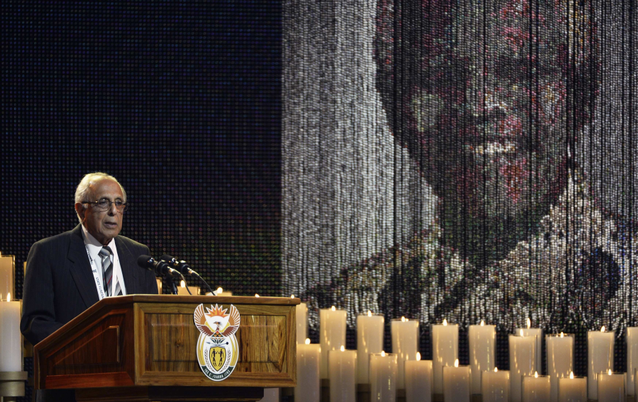
Ahmed Kathrada, close friend of former president Nelson Mandela, speaks during Mandela's funeral ceremony in Qunu in 2013. Picture: REUTERS
NELSON Mandela has left to join the "A-team" of the African National Congress (ANC), struggle veteran Ahmed Kathrada said at the former president’s state funeral in Qunu on Sunday.
"What I saw in hospital was a man helpless and reduced to a shadow of himself, and now the inevitable has happened — he has left us to join the A-team of the ANC," he told mourners gathered in a specially built dome. "He cut his political teeth on the non-racist, non-sexist policy for which he sacrificed his whole life."
Mr Kathrada said Mandela had now joined Albert Luthuli, Walter Sisulu, Govan Mbeki and many others from the ANC, as well as those from other parties who helped liberate South Africa, such as Helen Suzman and Steve Biko.
"The last time I saw Madiba alive was when I visited him in hospital," he said. "I was filled with an overwhelming sadness and emotion and I cried.
"He held my hand and it was profoundly heartbreaking, and it brought out all the emotions in me. My mind automatically flashed back to a picture of the man I grew up with and how I wish I’d never had to confront what I saw in the hospital.
"I first met him 67 years ago and I recall the tall, healthy, strong man — the boxer, the prisoner who easily wielded the pick and shovel when the rest of us couldn’t do so, the prisoner who vigorously exercised every morning."
Mr Kathrada said South Africa was deeply grateful for the sacrifice made by Mandela to ensure the country was a lively democracy.
"We are grateful that dignity has been restored to all South Africans. We are deeply grateful that the lives of thousands of people have improved and continue to improve," he said. "We are deeply grateful for a constitution that encompasses all that is good in us."
Mr Kathrada concluded his address by saying: “When Walter (Sisulu) died, I lost a father, and now I have lost a brother. My life now is in a void and I don’t know who to turn to ...
“The last few days the masses of people ... have demonstrated how very connected they feel to you. Farewell, my dear brother, my mentor, my leader.”
Obituary
It was through Mandela that the world learned the spirit of endurance and forgiveness, read an obituary read to mourners on Sunday by his grandson Ndaba Mandela.
“It is through Mandela that the world cast its eyes on South Africa and took notice of the severe and organised repression of black South Africans,” Ndaba said. “Yet, it was also through Mandela that the world would learn the spirit of endurance, the triumph of forgiveness and the beauty of reconciliation. Indeed, the story of Nelson Mandela is so much the story of South Africa.”
In a life that symbolised the triumph of the human spirit, Mandela and former president FW de Klerk accepted the Nobel Peace Prize in 1993 on behalf of all South Africans.
“The world icon worked tirelessly even after the achievement of democracy in South Africa to continue improving lives,” Ndaba read.
“Even as he retired from politics, his attention shifted to social issues such as HIV and AIDS and the well-being of the nation’s children.”
As a testimony to his sharp political intellect, wisdom and unrelenting commitment to make the world a better place, Mandela formed the Elders group, who, with other world leaders, used their collective influence and experience to support peace and promote the shared interests of humanity.
Also speaking at the funeral, Ethiopian Prime Minister and African Union chairman Hailemariam Desalegn said Africa was indebted to Mandela for the sacrifices he made.
He said Mandela held a special place in Ethiopian and African hearts, as he represented the oppression and injustice the continent had to endure from colonisers and their like.
“This moment is even more poignant for Africa ... Mandela’s life had been (full of the) trials and tribulations (facing the) entire continent. His life was a struggle against unparalleled odds ... a life of perseverance in the face of seemingly insurmountable challenges ...
“As a true leader of authentic personification of the ANC, Mandela’s life represented what was promising about the continent’s future, if we fight injustice,” Mr Desalegn said. “If we remain committed to the ideals of justice, liberation and above all the sanctity of human dignity, we can ultimately prevail over evil, no matter how stacked the odds are against us.”
Malawian President Joyce Banda received a standing ovation when she spoke about her position as a female president.
Many women in the audience shouted “Yes, yes!” when Ms Banda spoke about her presidency. They waved their hands in the air when she spoke about learning from Mandela’s example.
South Africans were not alone in mourning Mandela, Tanzanian President Jakaya Kikwete said.
“The people of Tanzania would like you to know you are not alone,” he said. “They will be with you during this period of mourning and thereafter. Your loss is our loss. He was our leader, our hero, our icon, our father, as much as he was yours.
“The people of Tanzania have lost a great friend ... a great comrade in arms.”
Pomp and ceremony
Earlier, ANC deputy president Cyril Ramaphosa, the programme director, welcomed guests from abroad and around the country.
"Each one of us ... (and) millions of people around the world have had their own Madiba moment," he told mourners. "Today we come to lay him to rest ... South Africa’s greatest son."
Mr Ramaphosa said: "Behind me are 95 candles lit early this morning. They represent the years of his life ... and more especially the contribution he made to our country."
He said it was imperative that the service ended in time. "In terms of the traditions of this part of the country, the person is meant to be laid to rest when the sun is at its highest," he said.
South African and international dignitaries, including Archbishop Emeritus Desmond Tutu, had gathered from early on Sunday at a specially constructed dome.
Mandela’s coffin, draped with a South African flag, was borne on a gun carriage as it was transported to the venue. It was taken along a dusty road lined by South African National Defence Force personnel. Cannon were fired, accompanied by a military band and parade.
The state funeral was to last for about two hours, followed by a traditional AbaThembu burial service that would end at about midday.
About 4,500 guests were attending the funeral at the Mandela family farm, and 450 had been selected to attend the final burial of the body.
A guard of honour comprised members of the army’s four most senior infantry regiments, the air force, the navy and the South African Military Health Service. During the entire service, the artillery was to fire a regular cannon salute, culminating in a full 21-gun salute when Mandela was finally laid to rest.
President Jacob Zuma walked immediately behind the casket as it was carried into the funeral dome.
Mandela’s widow Graca Machel and ex-wife Winnie Madikizela-Mandela took their seats in the front row. Both women were dressed in black and their hair was covered.
Archbishop Tutu changed course on Saturday night and announced plans to attend the funeral after all, after earlier saying he would not go because the government had not made him feel welcome and he did not want to "gatecrash" the funeral of his longtime ally and friend.
However, government officials said the archbishop had been accredited to attend and would be welcome.
With Sapa and Paul Vecchiatto


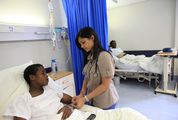
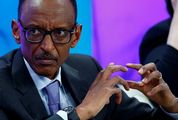

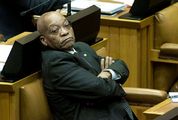





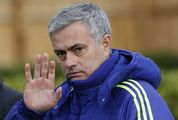
 News and views on the death, and life, of former president Nelson Mandela, with tributes and photographs
News and views on the death, and life, of former president Nelson Mandela, with tributes and photographs









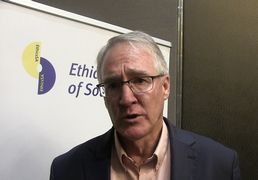





Change: -1.99%
Change: -2.11%
Change: -1.89%
Change: -2.48%
Change: 0.28%
Data supplied by Profile Data
Change: 0.00%
Change: 0.00%
Change: -1.99%
Change: 0.00%
Change: 0.00%
Data supplied by Profile Data
Change: 0.05%
Change: 0.04%
Change: -0.01%
Change: 0.08%
Change: 0.22%
Data supplied by Profile Data
Change: 0.00%
Change: 0.00%
Change: 0.00%
Change: 0.00%
Change: 0.00%
Data supplied by Profile Data